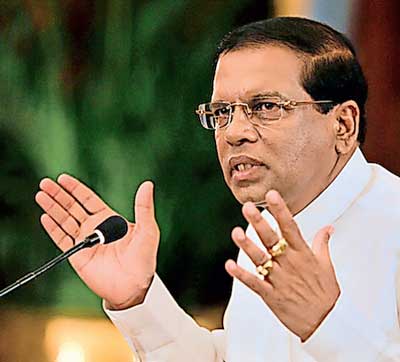Thursday Feb 19, 2026
Thursday Feb 19, 2026
Friday, 28 October 2016 00:01 - - {{hitsCtrl.values.hits}}
 President Sirisena seems to be governing by public speaking. He dropped a bombshell by criticising the Commission to Investigate Allegations of Bribery or Corruption (CIABOC) and also the Financial Crimes Investigation Division (FCID) and Criminal Investigation Department (CID).
President Sirisena seems to be governing by public speaking. He dropped a bombshell by criticising the Commission to Investigate Allegations of Bribery or Corruption (CIABOC) and also the Financial Crimes Investigation Division (FCID) and Criminal Investigation Department (CID).
It was reported that the President who left the country after delivering the speech, requested the Speaker to speak to the relevant heads of the Departments to ensure that there will not be interference to their work.
The Prime Minister who was in Belgium has also spoken to the Speaker to inform the heads of the departments and especially the DG of CIABOC to hold on until he arrives. However the DG of CIABOC who was out of the country at the time the President delivered the speech has already sent her letter of resignation by the time the Speaker has contacted her. The President accepted the resignation soon after he returned to the country.
The President has been criticised by many for this speech and there are valid reasons for these criticisms. The major point was that by his speech the President tried to reverse the trend of investigations of major frauds, malpractices and crimes that had been carried out during the previous regime. Also he was trying to influence the independent commissions appointed under the 19th Amendment to the Constitution which was against the very essence of the said amendment.
This was proven to a great extent by the resignation of the DG of CIABOC who did remarkable work after being assigned with the responsibilities of CIABOC and against whom the main portion of the speech was directed at. It was reported that the next file the DG was perusing was of Minister Rajitha Senaratne.
The President was also criticised that he was putting the interests of the SLFP ahead of the country and he was trying to safeguard Gotabaya Rajapaksa. All these allegations are apparently true but if there is a deep analysis of the present political situation the reality would be different.
 Different agendas
Different agendas
The main item of the political agenda of this Government is to find a solution for the ethnic problem of this country and to adapt a new constitution. That is the very reason for having this Unity Government. In the political history of this country our leaders and the Governments continued to postpone solutions to the ethnic problem due to political pressure from the opposition. The simple reason is that opposition parties continued to put their own political interests ahead of the interests of the country.
Well ahead of the last presidential election the Prime Minister mentioned about the so called “Lichchavi system” and a Government of Consensus. The reason is to find out a lasting solution to this problem. Although some extremists believe that after defeating the LTTE completely at war, the ethnic problem is solved, it is not so.
Even Denzil Kobbekaduwa, one of the greatest soldiers we ever had, said that there should be a political solution to the problem even if he would defeat the LTTE militarily. As Sarath Fonseka said he would not leave this terrorist problem to the next Army Commander, the Prime Minister and the President pledged that they would resolve this issue.
We have lost all the opportunities we had earlier to resolve this once and for all, and faced a brutal war for 30 long years. The people of this country should realise this rather than living in dream worlds and getting provoked every now and then by extremists with different agendas.
The culture of investigating
The punishing of culprits of the previous regime was not in the agenda of the new Government at the initial planning stages of forming it. This was brought in subsequently at the election campaign. It is true that not only the politicians but also the officials should be punished for their frauds and wrongdoing.
In India where corruption is very high politicians frequently get punished and go to jail. Good examples are former Prime Minister Narasimha Rao and Jayalalitha Jayaram the Chief Minister of Tamil Nadu. If the culture of investigating against the frauds of the previous regime is brought in, then as the General Public we can have the comfort that this type of investigation will be continued against the future Governments as well. It is a great comfort I would say but at what expense?
It is a well-known fact that there are allegations against current ministers of the Government and also especially against the Ministers of the previous regime. Can the Government go ahead with these allegations and if found correct, file cases against them? In that case can the Government get the approval for the primary objective of the Government which is to find a solution to the ethnic problem and adopting a new constitution? Should the Government sacrifice that objective in favour of punishing the culprits and establishing good governance? These are very tough questions but we should find solutions to these questions. It is like selecting one child out of two.
Four pillars
In Transitional Justice there are four pillars. Those are Truth, Justice, Reparation and Guarantee of Non-recurrence. In a post conflict situation like ours what would happen is that the rebels would say there were justified political reasons for their rebellion and as a result there were brutal activities.
The Government forces would say in order to counter the rebellion they had to engage in counter brutal activities. That is the Truth and how would the justice be enforced? Should we punish the rebels who are no more and Government forces who were engaged in illegal activities? One would argue that the Government forces by and large acted legally and those who were acted in an illegal manner should be punished, in order to safeguard the dignity of the armed forces. If there are a large number of forces who were engaged in illegal activities then there would be resistance from the armed forces.
So how can we engage in Reparation and Guarantees of Non-recurrence? In a similar type of situation the South African Government brought in the Truth and Reconciliation Commission. All parties engaged in brutalities came in and revealed their acts. Eventually they were pardoned since these activities were done in the context of the political situation that had prevailed. Those were not cases of personal revenge which if so would be crimes. Finally South Africa emerged from a difficult situation and achieved reconciliation which has far reaching effects.
At present it is true that the defence forces apply pressure to the Government against reconciliation fearing that there would be punishments against them if a mechanism of justice is established. Reconciliation cannot be achieved without the support of all the parties to the conflict. Therefore we should have a mechanism similar to Truth and Reconciliation of South Africa where all of them were pardoned if the truth was revealed. After all the truth should be known whether it was illegal, brutal or legal.
Cost analysis
Similarly the frauds committed under the previous regime should also be pardoned. The reason is this. It is not fair to investigate against the members of Joint Opposition and not investigate against the ministers in the Government who were in the previous regime. This should also be a part of Transitional Justice since the country needs to get the consent of all the parties in achieving a lasting solution to the ethnic conflict and adapting a new constitution.
If the present value of the future benefits of a resolved ethnic conflict and the benefits of a constitution agreed on by all can be calculated, it would be far greater than the cost of the frauds committed by the members of the previous regime. That is the price to be paid under the democratic governance system under the present circumstances. If the then Government was dissolved soon after the Presidential elections, the situation may have been different. It is also should be noted that the new constitution and the culture should ensure that corrupt persons should be punished in the future.
Having said that, this also should be said. The President alleged that the DG of CIABOC and the other heads of the departments mentioned had a political agenda. Not them, but the President is having a political agenda. They were carrying out their duty in good faith focused on the duty only and it did not match with the political agenda of the President and with the explanation given above. I think they should be exonerated of that allegation.
However it was evident in the speech that the President was trying to exonerate the members of the armed forces for the crimes they have committed. For those crimes they have committed they or the Rajapaksa family, if found guilty, should be punished. Everything cannot be pardoned and that price has to be paid by them.